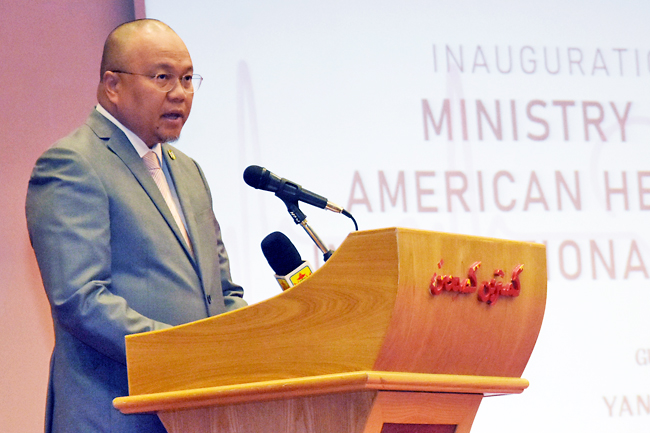The Ministry of Health’s (MoH) Resuscitation Policy and Framework, established in 2020, is a key initiative to strengthen resuscitation training and practices in Brunei Darussalam through guiding the training needs of healthcare professionals, the implementation of resuscitation trolley checklists and the formation of facility resuscitation committees.
Minister of Health Dato Seri Setia Dr Haji Mohd Isham bin Haji Jaafar said this during the inauguration ceremony for the MoH as an American Heart Association (AHA) International Training Centre (ITC) at the ministry’s Al-‘Afiah Hall yesterday.
“This policy is currently being revised to include requirements for community-based health facilities and also to develop a standardised cardiac arrest documentation and audit form for use across healthcare facilities, ensuring consistent documentation and auditing,” the minister said.
He also emphasised the critical role all healthcare facilities play in maintaining high standards of resuscitation preparedness, under the leadership of their clinical directors, chief executive officers, and medical superintendents.
He said, “Through the resuscitation committees, leaders must ensure that resuscitation trolleys are well-maintained and that regular Code Blue training drills are conducted to familiarise staff with resuscitation equipment and existing workflows. Some district hospitals and health centres have proactively conducted drills involving all staff, including contract cleaners and security personnel, and organised table-top exercises to identify gaps in emergency response. The Department of Nursing Services also plans to organise workshops on resuscitation trolley checklist familiarisation for nurses.”

The MoH’s Resuscitation Development and Monitoring Unit (RDMU) conducted a survey from November 2022 to January 2023 to assess basic life support (BLS) and advanced cardiac life support (ACLS) certifications for healthcare professionals across eight facilities, – Raja Isteri Pengiran Anak Saleha Hospital and primary health centres.
Of the 3,403 healthcare professionals surveyed, 42 per cent held valid BLS certifications, with paramedics leading, dentists, doctors and nurses.
For ACLS, 30 per cent of paramedics, 17 per cent of doctors, and two per cent of nurses were certified. Dato Seri Setia Dr Haji Mohd Isham said that while these figures highlight areas for improvement in certification validity, they do not reflect a lack of capability, as the gaps are likely the result of disruptions due to the COVID-19 pandemic.
“Nevertheless, this situation presents an opportunity to enhance our training programmes and increase certification rates,” he said.
“The MoH has also taken the initiative to develop standardised specifications for automated external defibrillators (AEDs) and manual defibrillators across healthcare facilities.
“This standardisation improves procurement efficiency, ensures consistency for healthcare professionals during emergencies, and enhances cost-effectiveness.
“This initiative will extend to other critical resuscitation equipment, such as central monitors and other resuscitation tools,” he added.
Dato Seri Setia Dr Haji Mohd Isham also said, “The ministry has invested in upgrading the National Resuscitation Centre to create a conducive training environment for faculty, instructors and providers, reinforcing our commitment to high standards in resuscitation training and ultimately improving patient outcomes.” – James Kon



















































